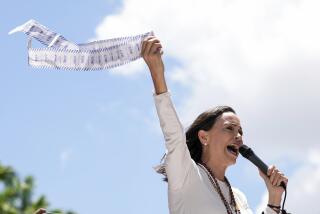Salvadorans Turn Out to Vote Despite Rebel Threats
- Share via
SAN SALVADOR — Defying rebel threats, Salvadorans went to the polls Sunday to cast ballots in legislative and municipal elections despite early morning rebel attacks that knocked out power to much of the nation.
“We ask every Salvadoran to risk their lives for two minutes for democracy,” said President Jose Napoleon Duarte after casting his ballot.
Duarte was expected to face his toughest challenge from rightist political parties since he came to power in 1984.
Government and military vehicles--with soldiers posted on them--ferried voters to polling places in the capital, and initial reports indicated a high voter turnout. Soldiers guarded polling stations and patrolled the streets of San Salvador and outlying areas.
Vehicles belonging to opposition parties also brought Salvadorans to polling stations, despite threats by rebels of the leftist Farabundo Marti National Liberation Front that they would open fire at moving vehicles and regard polling stations as military targets because soldiers would be posted there.
Rebel Boycott Ignored
The rebels, who vowed to disrupt what it called “the electoral farce,” had also called for an election boycott, although it appeared that voters were ignoring this demand.
At stake were all 60 seats in the National Assembly, the nation’s unicameral legislature, as well as mayoral contests in 262 municipalities. Official results were not expected until Tuesday.
Electoral Commission officials estimated that 65% of the registered voters in the capital cast ballots before polls closed. They earlier said that the turnout appeared to be about the same or slightly more than in the previous legislative elections in 1985, when 75% of the registered voters, or 1.2 million, cast ballots.
Voter turnout in outlying areas and the country’s interior was low, however, local officials said.
There were also several reports of violence. About 400 rebels attacked Cinameca, 65 miles east of the capital, and tried to steal ballot boxes, a military spokesman said. In San Jose Guayabal, 15 miles northeast of San Salvador, voting was delayed as rebels battled troops outside the town for more than an hour before retreating, the spokesman added.
Duarte Could Lose Majority
Pre-election surveys had indicated Duarte’s Christian Democrats would lose their majority in the National Assembly and the right-wing Nationalist Republican Alliance, known as Arena, would make the biggest gains.
Before to Sunday’s vote, the Christian Democrats controlled 33 assembly seats while Arena had 13. The center-right National Conciliation Party controlled 12 and small, right-wing parties held the two remaining seats.
Arena has stressed the country’s economic crisis, government corruption scandals and the U.S.-backed administration’s inability to end the 8-year-old civil war.
Sunday’s elections also were seen as a portent of the 1989 presidential elections, in which Duarte is not eligible to run. If Duarte’s party loses its majority, it would have to build a coalition with other parties to retain control of the government.
In San Salvador, voters turned out, even though the capital was without electricity for much of the day after rebels sabotaged power lines overnight. There were reports that power was out in 11 of the nation’s 14 provinces.
Thousands of people lined the capital’s dusty streets, seemingly unafraid of rebel threats in the country’s fifth electoral contest since 1982. Because of the rebel threat on transportation, many people said they had walked far distances in order to vote.
“I walked for four hours since 7 a.m. to reach the polling station,” Jesusa Cruz, 60, said after voting. “It is our duty to vote and even if we have to die for it, we will do it in the name of democracy.”
More to Read
Sign up for Essential California
The most important California stories and recommendations in your inbox every morning.
You may occasionally receive promotional content from the Los Angeles Times.













